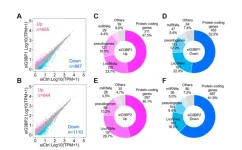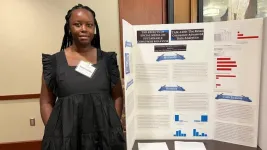(Press-News.org) Dr. Robert A. Harrington, a cardiologist and the Arthur L. Bloomfield Professor of Medicine and chair of the Department of Medicine at Stanford University, has been named the Stephen and Suzanne Weiss Dean of Weill Cornell Medicine and provost for medical affairs of Cornell University.
The appointment was approved by the Cornell Board of Trustees and the Weill Cornell Medicine Board of Fellows. Harrington - also a member of the National Academy of Medicine - will begin his new position on Sept. 12.
A past president of the American Heart Association (AHA), Harrington has chaired Stanford’s Department of Medicine since 2012. He previously served as the Richard Sean Stack, M.D. Distinguished Professor and director of the Duke Clinical Research Institute at Duke University.
“In addition to being an outstanding physician-scientist, Dr. Harrington is an energetic and proven leader, with a reputation for bringing people together to achieve shared objectives,” President Martha E. Pollack said. “I am looking forward to working closely with him as we continue to advance Weill Cornell Medicine’s mission as a world-class institution of patient care, scientific discovery and education of future health care leaders.”
The search committee, led by Pollack and Jessica M. Bibliowicz ’81, chair of the Weill Cornell Medicine Board of Fellows, included board members, faculty, alumni and senior administrators from Cornell, Weill Cornell Medicine and NewYork-Presbyterian.
“We are extremely excited to welcome Dr. Harrington to New York,” Bibliowicz said. “He is the right person to guide Weill Cornell Medicine and maintain its incredible trajectory of growth. He is a proven leader, as well as a prolific and esteemed physician-scientist. We look forward to seeing Weill Cornell Medicine thrive under his leadership.”
Harrington, who grew up and attended college on the East Coast, is excited to be returning to his roots, although he terms the move as “bittersweet” after 11 years in Palo Alto, California.
“The opportunity to come to Weill Cornell Medicine was really extraordinary for us, professionally and as a family,” Harrington said. He and his wife, Rhonda Larsen, who’s also on the Stanford faculty, have four grown daughters and five grandchildren. “I’m excited to help shape an already-excellent academic medical institution into its next version.”
Dr. Francis Lee, chair of the Department of Psychiatry at Weill Cornell Medicine, will remain as interim dean and provost for medical affairs until Harrington’s arrival in September. Lee has served as interim dean since Jan. 1.
“We are deeply grateful to Dr. Lee for his selfless service to our institution during his interim term,” Pollack said. “His leadership during this period of transition has been exemplary.”
A native of Somerville, Massachusetts, and a first-generation college graduate, Harrington graduated magna cum laude with a bachelor of arts in English in 1982 from the College of the Holy Cross in Worcester, Massachusetts. He received his medical degree in 1986 from Tufts University School of Medicine in Boston, followed by a residency in internal medicine at the University of Massachusetts Medical Center in Worcester, where he served as chief resident. Harrington completed a fellowship in interventional cardiology at Duke University Medical Center in Durham, North Carolina, where he became a faculty member in 1993 and led clinical research efforts until 2012, when he joined the Stanford faculty.
His research interests include evaluating antithrombotic therapies to treat acute ischemic heart disease and to minimize the acute complications of percutaneous coronary procedures. His passion for cardiology is, in part, personal: His mother died of a sudden cardiac event at age 42, during his senior year at Holy Cross.
In 2016, he was named a Master of the American College of Cardiology. He was awarded the AHA’s Clinical Research Prize in 2017 and AHA Council on Clinical Cardiology (CLCD) Distinguished Achievement Award in 2022. In 2022, he was awarded the Stokes Medal from the Irish Cardiac Society.
Harrington serves on the AHA board of directors, and served as AHA president in 2019–20. He is an elected member of the Association of American Physicians, the Association of University Cardiologists and the National Academy of Medicine.
Committed to training and mentorship, Harrington has served as the principal mentor for more than 20 postdoctoral clinical research fellows.
The author of more than 760 peer-reviewed manuscripts, reviews, book chapters and editorials, Harrington has also served as a member and chair of the U.S. Food and Drug Administration’s Cardiovascular and Renal Drugs Advisory Committee.
Harrington is enthusiastic about using technology to spread useful information on health and medicine; he is active on Twitter and hosts a podcast for practitioners, “The Bob Harrington Show.” His most recent podcast was titled “AI and Machine Learning in Healthcare for the Clueless.”
Harrington said Weill Cornell Medicine represents a “unique opportunity.”
“It’s part of an outstanding university,” he said. “It’s a job with scope – the research, the education and also the faculty clinical practice. It’s got an international presence, with a medical school in Qatar and other global programs. And it’s partnered with a phenomenal medical center, NewYork-Presbyterian. I couldn’t be more excited about joining Weill Cornell Medicine.”
END
Dr. Robert Harrington named dean of Weill Cornell Medicine
2023-06-01
ELSE PRESS RELEASES FROM THIS DATE:
Early career scientist wins prestigious Hungarian physics award
2023-06-01
Laszlo Horvath, an early career physicist at the U.S. Department of Energy’s (DOE) Princeton Plasma Physics Laboratory (PPPL) stationed at General Atomics in San Diego, is the winner of the 2022 Károly Simonyi Memorial Plaque from the Hungarian Nuclear Society. Established in 2007, the plaque “recognizes Hungarian researchers and engineers with outstanding achievements in the field of fusion plasma physics and technology.”
Horvath learned he had won the Simonyi Memorial Plaque not long ...
More evidence needed to confirm promise of remote or decentralized trials
2023-06-01
There’s one question that Hollings Cancer Center researcher Jennifer Dahne, Ph.D., co-director of the remote and virtual trials program at the South Carolina Clinical & Translational Research Institute, hears more than any other as she consults with clinical researchers about how to set up remote trials, also known as decentralized trials. Will these trials overcome the barriers that make it difficult for minority and underserved populations to participate in clinical trials? It’s also a question she often discusses ...
Forest birds with short, round wings more sensitive to habitat fragmentation, OSU study shows
2023-06-01
CORVALLIS, Ore. – Tropical forest birds, which tend to have wings that are short and round relative to their body length and shape, are more sensitive to habitat fragmentation than the long-, slender-winged species common in temperate forests, according to an international collaboration that included scientists from Oregon State University.
OSU’s Matt Betts and Christopher Wolf teamed with 14 other authors to analyze the wings of more than 1,000 species worldwide in a study led by Thomas Weeks of Imperial College London and ...
Astrophysicists confirm the faintest galaxy ever seen in the early universe
2023-06-01
Key takeaways
After the Big Bang, the universe expanded and cooled sufficiently for hydrogen atoms to form. In the absence of light from the first stars and galaxies, the universe entered a period known as the cosmic dark ages.
The first stars and galaxies appeared several hundred million years later and began burning away the hydrogen fog left over from the Big Bang, rendering the universe transparent, like it is today.
Researchers led by astrophysicists from UCLA confirmed the existence of a distant, faint galaxy ...
Stress granules control Alzheimer's gene transcripts and neuronal proteostasis
2023-06-01
“Determining the mechanism underlying RNA sequestration in [stress granules] [...] could represent a key goal in the discovery and development of suitable [Alzheimer’s disease] biomarkers and therapies.”
BUFFALO, NY- June 1, 2023 – A new research paper was published on the cover of Aging (listed by MEDLINE/PubMed as "Aging (Albany NY)" and "Aging-US" by Web of Science) Volume 15, Issue 10, entitled, “Stress granules sequester Alzheimer’s disease-associated gene transcripts and regulate disease-related neuronal proteostasis.”
Environmental and physiological stresses ...
MU textiles professor earns grant as part of USDA’s Higher Education Challenge
2023-06-01
When you think about big data and fashion, it seems unlikely that the two might be stitched together. However, the modern fashion industry depends on data analytics throughout the supply chain to serve customers in ways that champion innovation, including expanding designers’ creativity, calculating the environmental impact of making a product and keeping brands up to date on changes in the market.
In an inventive project funded by a Department of Agriculture (USDA) grant of $149,000 awarded to Li Zhao, a professor of textiles and apparel management in the University of Missouri’s College of Arts and Science, students will ...
Deep-brain stimulation during sleep strengthens memory
2023-06-01
While it’s known that sleep plays a crucial role in strengthening memory, scientists are still trying to decode how this process plays out in the brain overnight.
New research led by scientists at UCLA Health and Tel Aviv University provides the first physiological evidence from inside the human brain supporting the dominant scientific theory on how the brain consolidates memory during sleep. Further, the researchers found that targeted deep-brain stimulation during a critical time in the sleep cycle appeared to improve memory consolidation.
The research, published June 1 in Nature Neuroscience, ...
School toolkits
2023-06-01
Children and young people naturally spend a large amount of their time at school, college or in other educational settings. Whilst most children with JIA are able to access education, many require adaptations or specific support to enable them to fully engage in learning. But families of children with JIA report lack of awareness and understanding, and believe that schools need special resources to be able to support these children and young people.
In the UK, Juvenile Arthritis Research (JAR) has developed a toolkit to allow teachers and school staff to confidently support children with JIA, and the initial rollout was assessed ...
Long-term risks of targeted therapies
2023-06-01
Janus kinase inhibitors (JAKi) and biologics are the cornerstone of modern treatment for rheumatoid arthritis (RA). But there have been concerns over long-term side effects. New data from a national healthcare database offer reassuring findings for overall cancers and cardiovascular disease (CVD).
Patients with inflammatory rheumatic diseases have an increased risk of CVD compared to the general population.1 In acknowledgement of this, EULAR – the European Alliance of Associations for Rheumatology – has published recommendations for cardiovascular risk management ...
Managing anxiety and depression in arthritis
2023-06-01
Anxiety and depression are the mental health issues most commonly associated with inflammatory arthritis, and it is well-established that there is a link between mental health issues and poor health outcomes.2 The EULAR recommendations emphasize the need to assess mental health regularly;1 however, little is known about the association between self-management and mental health in people with inflammatory arthritis.
At the 2023 EULAR congress, Vestergaard and colleagues report on their cross-sectional study in Denmark. This included 42,407 adult patients with rheumatoid arthritis (RA), psoriatic arthritis (PsA), or spondylarthritis (axSpA). The aim was to find ...





